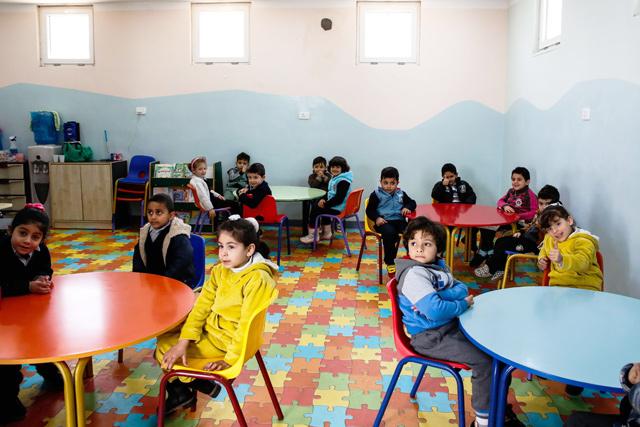You are here
‘New models for workplace daycare centres needed to boost women’s economic participation’
By Rana Husseini - May 18,2017 - Last updated at May 18,2017
AMMAN — Experts and parliamentarians on Thursday discussed the adoption of different models for workplace daycare centres, in order to boost women’s economic participation in the labour market and ensure a safe environment for their children.
The discussions came during a session organised by SADAQA and the International Labour Organisation (ILO), titled “The proposed National Framework for Workplace Daycares”, held in Amman.
The event, which aimed to be an advocacy platform to encourage the government to adopt the national framework, was also attended by local NGOs representatives, union members and representatives from the private sector.
The participants emphasised the need to consider daycare services as a public good, which should be widely accessible and affordable for all working families, said Sahar Aloul, a founding member of the SADAQA advocacy organisation.
In order for daycares to become a public good, Aloul told The Jordan Times, that “they need to provide a quality service and a safe environment for the children of working families, while at the same time making sure that incentives are provided for the employer”.
“We want to ensure that more bodies will support the establishment of daycare, by adopting various models in the workplace so that more women will participate in the labour market,” she said.
Emanuela Pozzan, Senior Gender Specialist at ILO, emphasised the importance of the care economy and its economic and social impact, quoting a UN study that showed that when countries invested 2 per cent of its GDP in the care economy, it increased employment by between 4 and 7 per cent. If this is addressed in Jordan, it could boost economic participation of women in the country, Pozzan argued.
Participants called for amending Article 72 of the Labour Law, which requires companies that employ 20 or more women, with a total of 10 children under the age of four, to provide an adequate daycare centre in the workplace, supervised by trained personnel.
They argued that more models for workplace solution to childcare should be adopted and that the gender stipulation in the article should be removed.
Instead, participants agreed, childcare is a “gender-neutral responsibility”, and the obligation to establish daycare centres at the workplace should be linked to the number of children, rather than the number of women.
In September last year, SADAQA released a study in which it described the unemployment rates among Jordanian women as “horrifying”, stating that around 45 per cent of women who leave the labour market in Jordan do so due a lack of childcare while at work.
According to the ILO, increasing women’s economic participation in Jordan, which stood at 13.3 per cent in 2015, could boost the GDP by $8 billion a year.
The participants also recommended introducing joint daycare centres in one geographical location, or raising the capacity of cooperatives and community-based organisations to provide this service, added Randa Naffa, also a founding member of SADAQA.
Other suggestions, according to Naffa, included financial incentives from the government to facilitate the process, such as offering tax deductions for establishing on-site daycare centres.
SADAQA is demanding the amendment of Article 72, she said, because “it only applies to big companies or is mainly adopted by the education sector”, adding that “there are challenges in other sectors and we have to provide different solutions so that it will work for many sectors.
“Such solutions,” according to Naffa, include having companies contract nearby daycare centres to avail of their services, or to provide vouchers that would help working mothers and families.
Many studies have shown the importance of daycare centres in the workplace, according to a press release by SADAQA.
Most research confirms that daycare centres increase the number of women in the workforce, therefore helping increase a country’s GDP in the long run, the press release said.
In addition, they improve employee morale and productivity. However, despite their many advantages, workplace daycare centres were close to non-existent five years ago in Jordan before the establishment of SADAQA, according to the press release.
Thursday’s recommendations will be delivered to the relevant ministries and governmental entities, Aloul said, adding that “For the national framework to be adopted relevant stakeholders should assume their roles.”
SADAQA was launched as a campaign in 2011, registering in 2012 as a non-profit organisation which mobilises a wide range of activists to advocate for a work-friendly environment in compliance with Article 72 of the Labour Law and with the aim of increasing women’s economic participation in Jordan.
Related Articles
AMMAN — A local organisation has called on the government and labour entities to adopt practical measures to encourage the establishment of
AMMAN — The Ministry of Labour on Wednesday renewed a Memorandum of Understanding (MoU) with SADAQA, a non-profit organisation advocating fo
AMMAN — SADAQA organisation plans to develop a business case report on the financial benefits of establishing daycare facilities at the work














